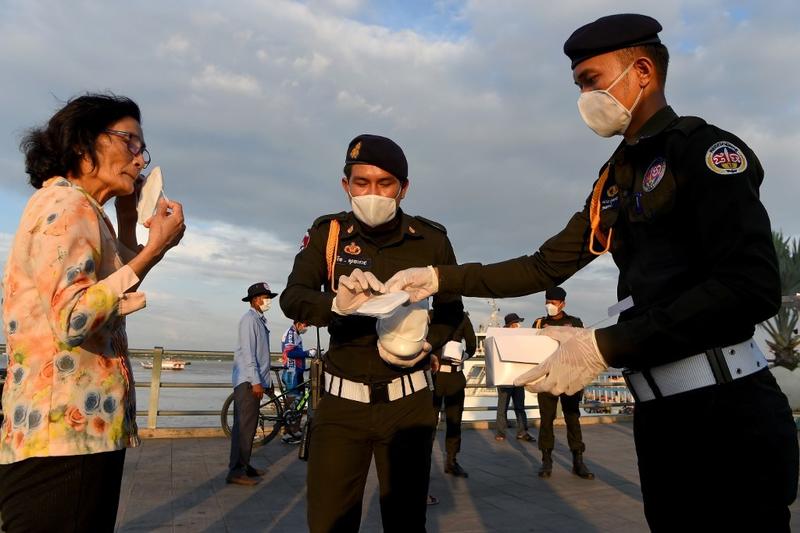 Military police officers hand out free face masks to people, amid concerns over a spread of the Covid-19 coronavirus at a park in Phnom Penh on November 12, 2020. (TANG CHHIN SOTHY / AFP)
Military police officers hand out free face masks to people, amid concerns over a spread of the Covid-19 coronavirus at a park in Phnom Penh on November 12, 2020. (TANG CHHIN SOTHY / AFP)
After months of sporadic new infections, Cambodia is facing its biggest challenge since the outbreak of COVID-19.
As of Dec 11, a total of 40 cases linked to the country’s first community transmission were reported, according to data from Cambodia’s Ministry of Health.
To control the contagion, Cambodia has closed down schools, museums, cinemas and theaters nationwide. It also banned mass gatherings in Phnom Penh and Siem Reap while contact tracing was expanded to more provinces.
As of Dec 11, a total of 40 cases linked to the country’s first community transmission were reported, according to data from Cambodia’s Ministry of Health
The beginning of the community transmission can be traced back to Nov 28, when six people in a family, residing in both the capital of Phnom Penh and the northwestern Siem Reap province, tested positive for the virus. The origin of the infections remains under investigation.
ALSO READ: Indonesia's COVID-19 cases surpass 600,000
“The Nov 28th event is the biggest COVID-19 crisis Cambodia has encountered since the beginning of the pandemic,” said Veasna Duong, head of Virology Unit at the Institut Pasteur du Cambodge, a research organization in Phnom Penh. He said it is still uncertain how the crisis will spread.
IPC, which detected the first COVID-19 case in Cambodia on Jan 27, has been designated by the MoH to be the testing laboratory for the latest community transmission. According to Duong, the Virology Unit has conducted COVID-19 testing on 150,000 samples since Jan 22, with 15,000 tested from the current event as of Dec 10. “The amount of samples tested a day reached as high as 3,800,” Duong said.
“The biggest challenge is that we are not able to identify the source of this community outbreak and that the event occurred during the Black Friday (shopping) event where people amassed in different shops.”
Daniel Tan, Cambodia country coordinator for the Sydney Southeast Asia Centre (SSAC) at the University of Sydney, said the latest cases showed that no country can afford to be complacent with controlling COVID-19.
“Before the first local transmission on Nov 28, Cambodia had relatively effective control measures,” said Tan. “By the end of March, Cambodia closed its borders, imposed quarantine requirements, closed schools, encouraged mask-wearing, social distancing and canceled its Khmer New Year holiday.”
ALSO READ: Water info-sharing platform launched for Mekong nations
Despite having far more limited resources for pandemic control than developed countries, Cambodia, with a population of about 16 million, has recorded a total of 357 COVID-19 cases as of Dec 11 – of which the majority were imported – with 307 recoveries. No deaths were reported, according to the MoH.
The Southeast Asian country also received recognition for its effective control measures from the international community, including the World Health Organization (WHO) and experts with the World Bank.
Li Ailan, WHO representative to Cambodia, said in addition to responding well to imported cases and other events, the Cambodian government has strengthened preparedness for largescale community transmission through the implementation of the Cambodia Master Plan for COVID-19, with an emphasis on local preparedness.
Li said that while having a local cluster is concerning, it is not surprising given the fact that COVID-19 continues to circulate worldwide. Li said Cambodia needs to deal with two things at once. “(We need to) respond to the recent cluster, and also further strengthen preparedness so that Cambodia is ready to respond to future outbreaks and possible largescale community transmission,” she said.
ALSO READ: President Xi honors Cambodia's Queen Mother
On Dec 7, Prime Minister Hun Sen said that the kingdom will provide free COVID-19 vaccines to citizens with a budget to buy 1 million doses of the vaccine in the first phase to provide to high-risk groups.
Cambodia aims to vaccinate up to 10 million citizens, said Hun Sen, speaking at a regional summit on Dec 9. Other countries in Southeast Asia are also working to secure COVID-19 vaccines. Malaysia has pre-ordered 12.8 million doses of vaccines from drugmaker Pfizer. Thailand’s National vaccine Institute signed a contract in October with the University of Oxford and AstraZeneca for the mass production of a COVID-19 vaccine locally.
On Dec 6, Indonesia received 1.2 million doses of vaccines from Sinovac. The Chinese pharmaceutical company has committed to provide bulk vaccines to Indonesia’s state-owned Bio Farma, allowing it to produce at least 40 million doses.
While there are a lot of good news in COVID-19 vaccine development globally, WHO’s Li said there are still uncertainties and challenges.
“We expect vaccines to begin arriving in countries sometime in 2021,” said Li.
READ MORE: China, Cambodia sign FTA
Although the testing rates in Cambodia are relatively low, Tan from SSAC said that “there is a possibility that the government may be able to control the outbreak by localized lockdowns” as well as getting major city residents to work from home and through contact tracing.
“This is the not the first breach in Cambodia’s COVID-19 history,” said Tan.
On Nov 4, Hungarian Minister of Foreign Affairs and Trade Peter Szijjarto tested positive for COVID-19 following a diplomatic visit to Phnom Penh the day before. More than 1,500 people were placed under quarantine, including Prime Minister Hun Sen.
“Our common goal now is to stop further transmission of COVID-19 in order to prevent largescale community transmission, which would have huge health and socioeconomic impacts,” said Li from WHO.
“We must be ahead of the curve,” she added.
Xinhua contributed to this story.


